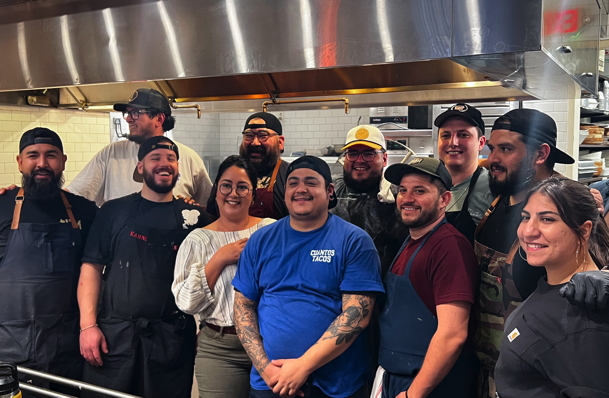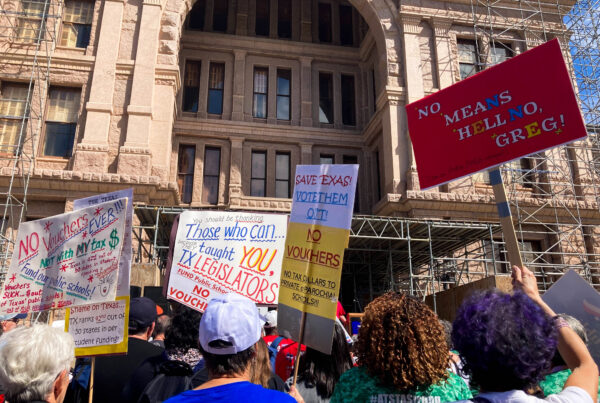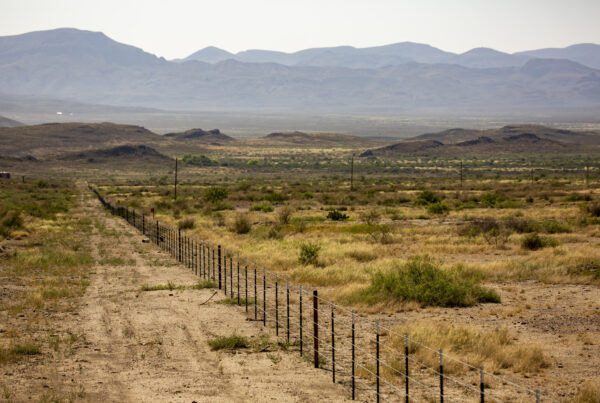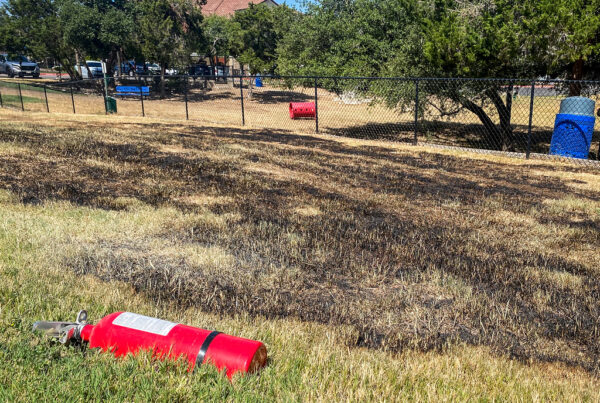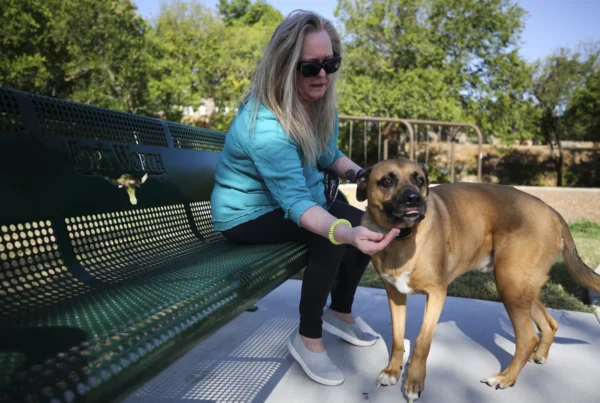It’s no secret the restaurant business can be brutal. Add a global pandemic into the mix and the atmosphere couldn’t have been more bleak for many in the hospitality business. But in turbulent times, it is often the ones we’re closest to that we lean on.
This couldn’t be more true for the folks at the center of a new Austin PBS documentary series focused on three Austin eateries that one might think would be in direct competition. Instead the owners’ friendship has helped grow their businesses, and built their reputation as the “Taco Mafia”.
The Texas Standard spoke with chefs and owners at three buzz-worthy taquerias featured in “Taco Mafia.” Beto Robledo owns Cuantos, Edgar Rico founded Nixta, Anthony Pratto is the man behind Descada They were joined by the producer of the series, Alex Wolff from Austin PBS.
Listen to the interview above or read the transcript below.
This transcript has been edited lightly for clarity:
Texas Standard: What is the taco mafia? Anyone want to take take up that one?
Edgar Rico: I think the taco mafia for us – we consider ourselves a collective of taqueros who are just trying to feed people and do good things in our community for the betterment of putting up and elevating the culinary scene here in Austin and also just trying to take care of our community at the same time.
And run a business. Let’s just get real here. Part of this sounds like was necessity. I mean, this partnership was critical to your survival, it sounds like, no?
Beto Robledo: Yeah. And also, it helps us to show that there’s plenty to go around for everybody. It’s better to unite and work together and do things together than separately.
Texas Standard: So are you all in the same general area or what exactly? What brought you together?
Edgar Rico: Yeah. all of our taquerias are literally a mile from each other, We always tell people, you should do the taco mafia tour and you can walk literally to all of our taquerias in like a 30-minute walk and have some of the best tacos, I think, in the country. And yeah, we definitely are within range. But like Beto says, none of us consider ourselves competition because we each know that each of our styles are so drastically different in terms of flavor and styles of tacos that we do that. Like Beto says there’s enough bread to go around the room for all of us.
I think that’s not the sort of thing they teach you in business school, is it? This kind of cooperation? Do you have a bit of a negative here? I mean, did you find that you were taking a little bit of this on the chin once you were sort of helping out the competition? Anyone want to take that?
Anthony Prstto: It didn’t start out that way. So it all started out kind of naturally. We were frequenting each other’s spots, just looking for good food. And we noticed that we were all doing something special. We were just putting our heart and soul into the dish and not just trying to make profit off of it so we could recognize the hardworking labor that is involved in creating a product so tasty and consistent. And we just kind of gained a mutual respect for each other in the beginning. And from there, just us frequenting each other’s spots and just giving amends to each other and commending our performances. We kind of just naturally came together during those hard times based off of just friendship in the beginning.
Texas Standard: I want to bring in Alex here. You’re the producer of this series. How did you get turned on to this? Were you just having tacos one day and you stumbled across this story or what?
Alex Wolff: Yeah, that’s kind of the long and short of it. But really, I moved to Austin from Los Angeles in 2019 and immediately wanted to find where the best tacos in town were. And I was fortunate that within three months of moving here is when Nixta and Cuantos both opened their doors and discovered I was already around. And through them being really, really skilled at using social media as a platform for promotion, I found Nikta first and saw how they were supporting each other. They turned me on to Cuantas and Descada was already around. I tried all their food. It was, you know, three of the best tacos I’ve ever had in my life. Just like Edgar said, such unique experiences. I was a fan. And then following them on social media, seeing how they started supporting each other through hardships, really personal issues. They’d get together and do crowdfunding for each other. They do collaborations, specials, they’d advertise for each other. It was it was really unfamiliar to me, especially coming from Los Angeles, where you couldn’t survive without being really competitive. And just from following them and getting to know them through my phone. I just recognized that what they were doing was really unusual and really special.
Texas Standard: Do you think that this is something that’s that can be replicated in other places? Or is there something special about Austin? I mean, since you were coming from LA and you were talking about the cutthroat competition that you saw among a lot of retailers there, Alex, was there something special about what was happening in Austin, or could this be done in other places?
Alex Wolff: Well, first of all, I think it’s important to recognize that this type of work is already being done in other places. What the talk of mafia is doing is nothing that they’ve necessarily created. They’re just doing it to a level that I’ve never personally seen done before. But there’s a history of the hospitality industry in the Latino community taking care of their own, supporting each other. And that’s happening all across this country. But to the degree that it’s happened with them, I don’t think it could happen anywhere. But Austin, There’s a level of community here that I haven’t experienced anywhere else that I’ve lived.
Texas Standard: Edgar, even though at your respective restaurants, the focus is tacos and Mexican food, there’s also a touch of other cultures in some of what you serve up. Could I ask you, Edgar, about some of your influences?
Edgar Rico: Me and my wife co-own the restaurant. My wife is actually of Persian descent. Her family immigrated here in the 70 after the revolution in Iran. And my background is definitely unique. I had actually never before opening in taqueria had never worked in a taco spot. My background is actually mainly in fine dining and Michelin-starred restaurants. I had worked at a couple of Michelin-starred restaurants in Los Angeles and then took a pillage to Mexico before opening Nixta, in which I decided to work at Pujol, which is like one of the world’s 50 best restaurants, and really immersed myself in the technique of learning how to make some of the best corn tortillas on Earth in Mexico, and then decided to open up taqueria, in my opinion, is like the most taco-centric town, I think in the USA.
I mean, for us it’s all love and we like to tout that flag, but it’s because we’re very proud of what we do here and what the culture of tacos are here in the city of Austin. So, if you come to our restaurant, you will see Japanese influence, you will see Iranian influence, you will see Mexican influence. And then anywhere else, I feel like I’m inspired from. There’s definitely a lot of French technique in everything that we do, since most of my background is iin classic French training. So I like to do kind of a mix of what my interpretation of what I think Mexican food is, because, I think the word authenticity is a word that’s thrown around a lot of times that doesn’t really have any meaning because everyone’s experiences growing up is different.
Texas Standard: Anthony, I know you come from an Italian family. You’re not tempted to put any marinara on a taco, are you?
Anthony Pratto: They have to stop me quite a bit. I just say it’s a salsa roja .
Texas Standard: But do you find that that it works its way into into your menu too?
Anthony Pratto: Um, not really the menu that I serve right now, but personal things I cook. Yes. Like I’ve always grown up cooking with very fresh ingredients, making things from scratch, just doing it the hard way, not the easy way. That’s exactly how I learned how to cook. So whenever I do cook something, especially Italian food, it’s like an all-day event. But that’s like part of it because we would get around with family and just cook all day, like Sunday sauce and stuff like that. But the there’s a lot of similarities with Mexican food and Italian food – not really in terms of flavor, but just how robust everything is. Like we like a lot of flavor in our food. So does Mexican cuisine. And there’s a few crossovers where I notice, like culturally it’s very similar Italian and Mexican culture. So cooking Mexican food. And my partner’s from Mexico City. I grew up, went to high school with him. It just felt it felt natural. And it’s something that I just fell in love with.
Texas Standard: Beto, are you mixing it up at your place?
Beto Robledo: Not at all. I was born and raised here in Austin, and growing up and seeing how the whole foods industry in Stockton alone and then from going back and forth visiting family, I was always thinking to myself like, we’re so close to the border, especially in the Valley, They have much more opportunities with flavors wise and, and availability. But here in Austin, I always felt like it was like room for more when it came to, like as close as possible to a street style in Mexico. So after years of traveling, I finally got to go to Mexico City. And try the Mecca where the street taco started. And then I look around, I came back, gave myself like a year of trial and error and building out the little truck and decided that I won’t try to mess with anything that’s already the blueprint of taquerias is in Mexico City. And there’s one almost on every corner. But I tried to do that as much as possible and bring that here.
Texas Standard: Well, let me ask you something Beto, because I was joking around about San Antonio and how somebody might try to might get upset with someone declaring Austin is the taco capital. But, you consider the camaraderie that you’ve developed with Edgar and with Anthony. Obviously, this seems positive. I wonder how you feel about these sort of city taco wars that we have here in Texas. Should we put that to bed or do you think that’s good for business?
Beto Robledo: Well, I wouldn’t call it a war. I would just call it a huge collaboration. With what we do and when we travel to different cities now to do festivals or so forth, whatever connections that we have in that city, we try to bring up the fact that, hey, you know, if you know the timing is right, we would like to come up here and do a pop up with you or a club with you and go from there route. And we have a lot of homies in San Antonio as well. So hopefully someday in the future, we can do a huge city fest of Austin, Dallas, Houston and San Antonio. That would be something amazing. And then also, obviously the homies down in the Valley: Brownsville Mission, McAllen. Hopefully this could be the start of something like that possibly happening. But what we really want to do at the end of the day is just make it for the cool people and just put smiles on faces.
Texas Standard Alex, Where can people watch outside of Austin?
Alex Wolff: Well, this show is going to be streaming nationally on the PBS video app starting October 9. It’ll be available for anyone around the country. Just sign up for the PBS Passport app and you’ll get your access.


